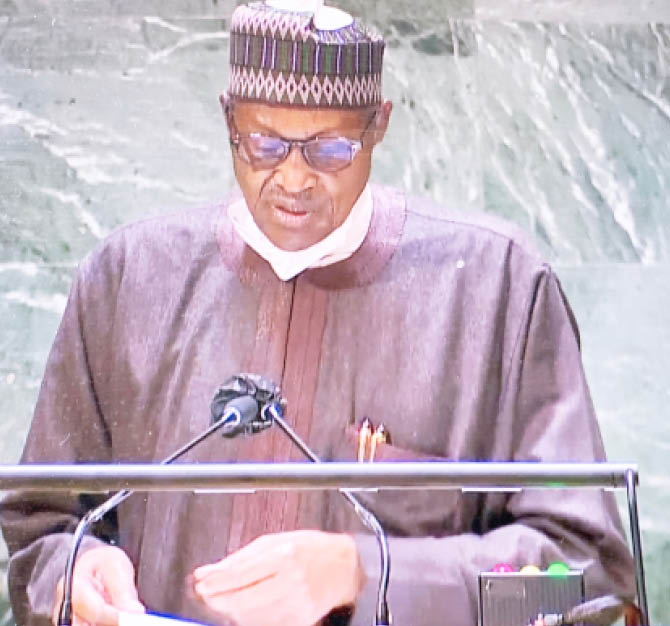As another UNGA comes to an end
It is instructive that while President Buhari was addressing the UNGA on the need for debt relief for developing..

FILE PHOTO: President Muhammadu Buhari addressing the 76th session of the high level General Debate of the United Nations General Assembly at the UN headquarters in New York recently, Photo NAN
Another meeting of the United Nations General Assembly (UNGA) has come and gone and not a few Nigerians are wondering what is the country’s take away from this annual event. Every year, this meeting is held in the United States of America (US) with a large delegation from Nigeria in attendance. But after the meeting, not much is heard in the area of implementation of decisions taken.
The UNGA, which draws attendance from heads of states, various world statesmen and reputable personalities has become a convenient forum for formal and informal interactions on issues of global significance. Countries use the opportunity of the gathering to meet on the sidelines to discuss and advance issues of mutual interests, which explains the need to have a complement of officials representing various areas in the national delegations to the assembly. It is, therefore, both a matter of compulsion and opportunity for countries to attend the UNGA for the various benefits that can be derived.
The UNGA this year, which theme is on biodiversity had in attendance President Muhammadu Buhari, whose address centred on the need for developed countries to ease the debt owed them by developing countries as a result of the effects of the COVID-19 epidemic.
It is instructive that while President Buhari was addressing the UNGA on the need for debt relief for developing countries, our delegation to the assembly hardly reflects the need for the call. This is because those countries to whom the address was directed will not fail to find the irony and disconnect between the debt relief we seek from them and the lack of prudence and accountability in our application of resources. This much is evident from the delegation we send to the UNGA every year in view of the lean resources that government needs to cope with amidst compelling issues in the country.
As a member of the United Nations, it is incumbent on Nigeria to attend and participate at the UNGA and join other countries to deliberate on issues of germane importance to the world, however, it must be of benefit to the country.
It is our belief that all countries that attend the event actually take home something of benefit to their individual countries and that is what it should be for Nigeria too.
Accordingly, it is time for the government to review its delegation to the annual event and the people selected to attend. Every year, a retinue of government officials including members of the National Assembly, presidency officials, ministers and state governors accompanied by their officials and aides head out for the meeting. But many of them hardly attend the sessions, as they use it as an opportunity to go on a shopping spree. Some others who attend are not prepared for the issues discussed.
In fact, the event has become somewhat of an annual ritual, where all sorts of government officials some of whom with nothing tangible or related to the issues to be deliberated at the assembly are included in the delegation at the government’s expense.
We note the importance of Nigeria’s presence at the event, but the big question is whether it is getting anything tangible out of it. We believe that for reasons of personal assistance, protocol and security of the president, some of the officials on the delegation are necessary. We also believe that the presence of some of the ministers whose ministries have a role to play in the issues to be deliberated upon at the UNGA is required to provide the necessary guidance on the issues to be discussed and also to implement the decisions reached subsequently. All these can be done with a smaller number of officials complemented by resident diplomats at the Nigerian permanent mission at the United Nations and the Consulate, all in New York as well as the embassy in Washington D.C. Those who have no need to be in the delegation should not be allowed.
Also, the government should ensure that Nigerians actually see the dividends of the UNGA, through domestication and implementation of decisions made at the meeting.
